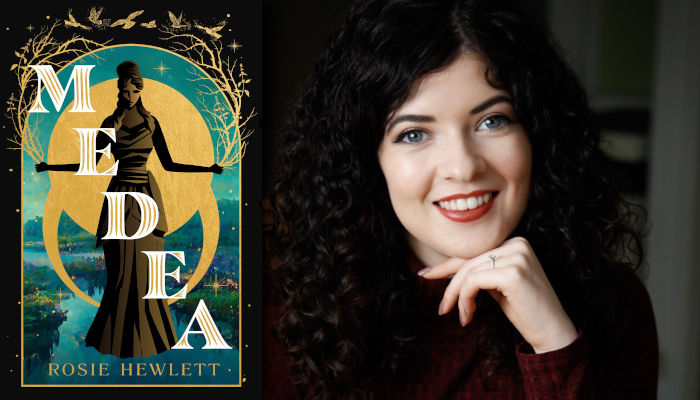Medea Unveiled – Rosie Hewlett chats about her dark and epic feminist retelling of Medea
More about the book!

Women in Greek Mythology have historically been relegated to roles as villains or victims due to the patriarchal society of Ancient Greece, but the recent resurgence of myth retellings by female voices is reclaiming their stories and allowing them to be seen as heroes, says Rosie Hewlett.
‘Women were the passive damsels in distress, whilst men were the valiant heroes.’
Though there are many incredible women in Greek Mythology, they are never depicted as the heroes of their stories – they are either the villains or victims (sometimes both, as in Medea’s case). This is hardly surprising, considering Ancient Greece was a patriarchal society that viewed women as second-class citizens, and all these stories were written by men for a male audience. Indeed, we must remember that, for centuries, history survived solely through men. As such, women have fallen victim to the male gaze, casting them to the sidelines of stories whilst the men take centre-stage.
Even in recent times we can see this happening: just look at the 1963 film Jason and the Argonauts. In it, Medea is depicted as the vapid love interest, having all her agency assigned to Jason (he slays the dragon, defeats Talos, and rescues Medea from nearly drowning). Medea’s role as a witch is distilled down to a provocative dance in honour of Hecate, painting Medea as a sexualised figure rather than the powerful sorceress she truly was. This film demonstrates gender stereotypes during the sixties: women were the passive damsels in distress, whilst men were the valiant heroes. This movie is still regarded as a cult classic and is the reason many people today think of Jason as the hero of his myth and have all but forgotten Medea.
This is exactly why the recent resurgence of myth retellings is so important, because it means these stories are finally being reclaimed by female voices, allowing women from the Ancient World to be the heroes of their own stories and take their rightful places in history.
I have studied Classical Literature and Civilisation for many years, and the story of the formidable ‘Witch of Colchis’ has always undoubtedly been my favourite. It is hard not to be captivated by Medea, she is, after all, the most powerful and controversial woman in Greek Mythology, and the scope of her life is simply epic. Yet, despite this, Medea has been remembered by history as just Jason’s ‘vengeful ex-wife’, forcing her to exist in his shadow. I wanted to rectify this injustice and to write a book that would go back to the very beginning of Medea’s story and shed new light on her notorious ending, allowing readers a deeper understanding of this fascinatingly complex woman. As some may know, Medea makes some questionable decisions throughout the course of her life, and though I did not want to excuse these flaws, I wanted to explore the thread of humanity woven within them, to give readers the opportunity to decide for themselves whether Medea truly was deserving of the title of ‘villain’.
As well as researching the various depictions of Medea, I also wanted to ensure I allowed myself the space to create my version of her. Though I have stayed true to Medea’s life, I have also enjoyed adding my own colour and detail, bringing new elements to her story that slot into place with the original narrative. This is what I love about Greek Mythology, its ability to be adapted and changed, allowing these stories to find new life and continue captivating us time and time again.
- Medea is out now.
~~~
This article was originally published in The Penguin Post, a magazine about books for book lovers from Penguin Random House South Africa.
Categories Fiction International
Tags Medea Penguin Random House SA Rosie Hewlett The Penguin Post
